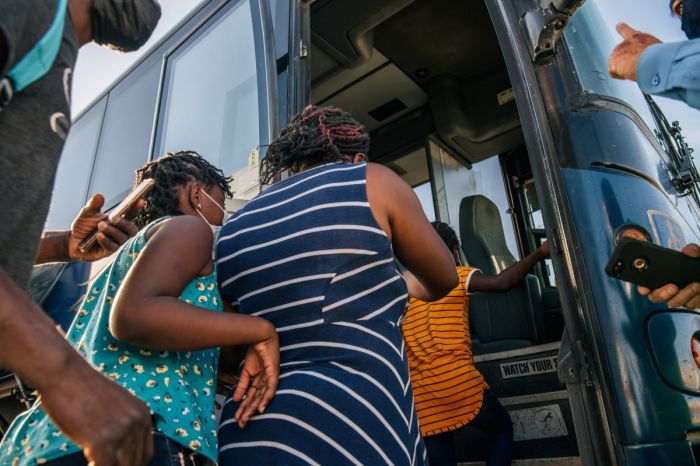
Christian advocacy organizations are raising alarm as the Trump administration plans to terminate Temporary Protected Status for Haitian nationals by Sept. 2, ending their legal residency and work authorizations in the United States amid fears of insecurity back home.
The decision, which could impact over 500,000 migrants, followed a review of country conditions and consultations with other agencies, concluding that Haiti no longer meets the statutory requirements for TPS designation, Secretary of Homeland Security Kristi Noem said in a statement.
“The environmental situation in Haiti has improved enough that it is safe for Haitian citizens to return home,” a DHS spokesperson said. However, critics have pushed back against those assertions.
World Relief, an Evangelical humanitarian organization authorized by the State Department to resettle refugees in the U.S., criticized the move, stating that it affects Haitians who have lived in the U.S. lawfully since TPS was first granted after the 2010 earthquake and others who fled instability following the assassination of Haiti’s president in 2021.
“Another week, another mass illegalization of families and individuals who have been lawfully and peacefully residing in our country,” said World Relief CEO Myal Greene.
Many of the individuals losing TPS, Greene said, had already cleared background checks and were employed, supporting their families both in the U.S. and back home. Without another legal status, such as asylum, these individuals would become vulnerable to deportation once TPS expires in September.
In Springfield, Ohio, where a growing Haitian community has become part of the local workforce, the announcement stirred renewed anxiety.
Vilès Dorsainvil, a native Haitian and minister, serves as the executive director of the Haitian Community Help & Support Center in Springfield. He came to the U.S. on a tourist visa in January 2020 and was granted TPS by the Biden administration along with other Haitians.
He and other Haitians came to the U.S. to escape the grip of gangsters back home, who have taken over the streets and are targeting people assumed to have affluence.
If forced to leave the U.S., Dorsainvil, who attends Central Christian Church in Springfield, said he would head toward Canada, where he has family.
“Many of us coming — it’s not because we were looking for jobs,” Vilès said last month. “We were being pushed away by the situations. You had to choose between your life and the job you had.”
“I am a community-oriented person. I am a Christian and I love Jesus. I like to serve people. I think serving people is my calling,” he added.
Ohio Governor Mike DeWine, a Republican, has previously praised Haitian workers in Springfield, saying, “The companies tell us that they are very good workers. They’re very happy to have them there, and frankly, that’s helped the economy.”
Rev. Patrick Mahoney, director of the Christian Defense Coalition, wrote on X that the administration’s claim that conditions have improved in Haiti is “absolutely NOT” accurate and warned that returning Haitian families would face grave threats of violence.
The coalition held a prayer vigil, news conference and demonstration at the U.S. Capitol on March 6 in response to the Trump administration’s earlier announcement that it might revoke TPS status for the Haitian community ahead of schedule.
At the time, Alexei Laushkin, founder of Kingdom Mission Society, called the Haitian community in the U.S. “hardworking, faith-filled, freedom loving people.”
“There are great dangers Haitians have fled from and would have to go back to,” he said. “Companies want them, their neighbors love them.”
Rev. Mahoney added that many Haitian families there fear they will become immediate targets of gang violence if deported.
World Relief Haiti country director Pascal Bimenyimana also questioned the Department of Homeland Security’s rationale, stating that Haiti remains under a state of emergency.
“The U.S. Department of State has warned Americans not to travel to Haiti’ due to kidnapping, crime, civil unrest, and limited healthcare,'” Bimenyimana noted. He added that forcibly sending people back would increase the burden on an already unstable country.
Recent court rulings have made the administration’s move more feasible.
Last month, the U.S. Supreme Court permitted the Trump administration to terminate TPS protections for Venezuelan nationals. This month, the high court cleared the way for the administration to remove TPS status for Cuba, Haiti, Venezuela and Nicaragua.
As the Trump administration plans to end TPS for Afghanistan, effective July 14, concern has been raised by a church in North Carolina over the fate of two dozen Afghan Christian refugees facing deportation who attend the church.
“We are continuing to try to reach out to senators and congressmen and other people who may know, have contacts … in the administration,” Julie Tisdale, a seminary student who attends the Church of the Apostles in Raleigh, told The Christian Post earlier this month. “We have lots of people who have told us that they understand, they’re sympathetic, but we have yet to find anybody who’s willing to really be the champion for this and raise the issue very publicly.”
Advocates have also questioned the removal to Panama of a group of Iranian Christians who entered the U.S. illegally. They now have until December to find refuge in a third country.
















